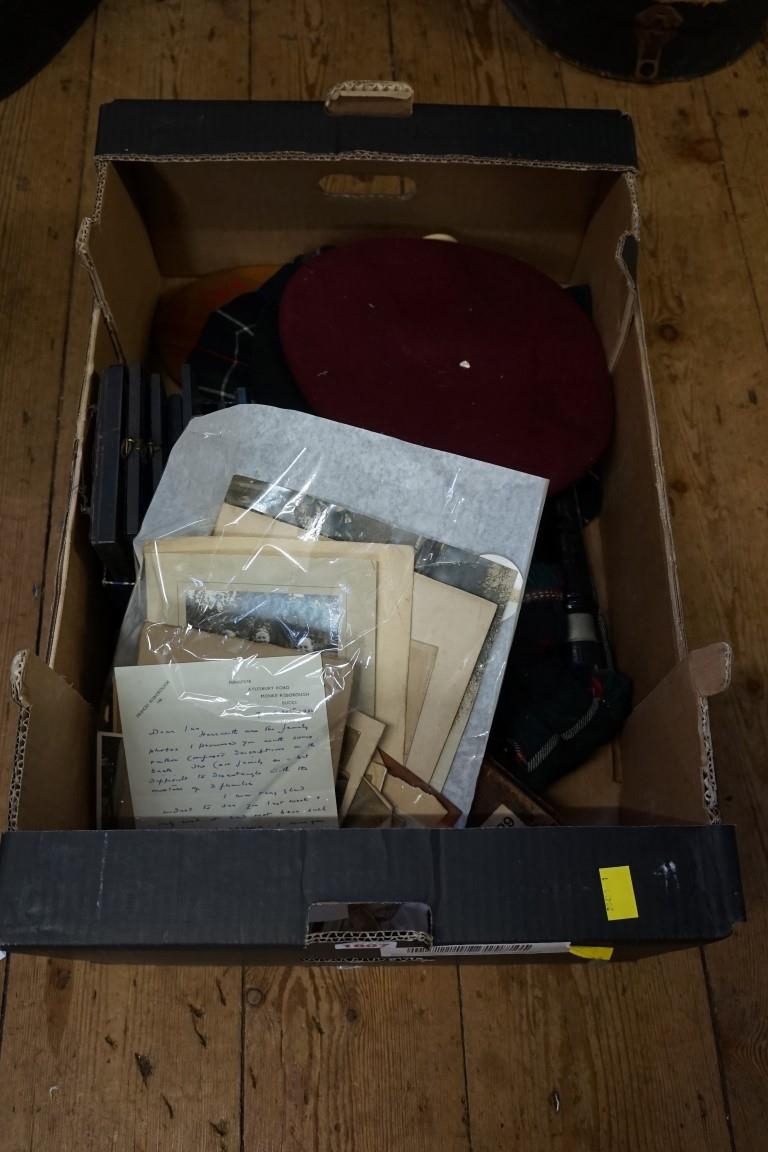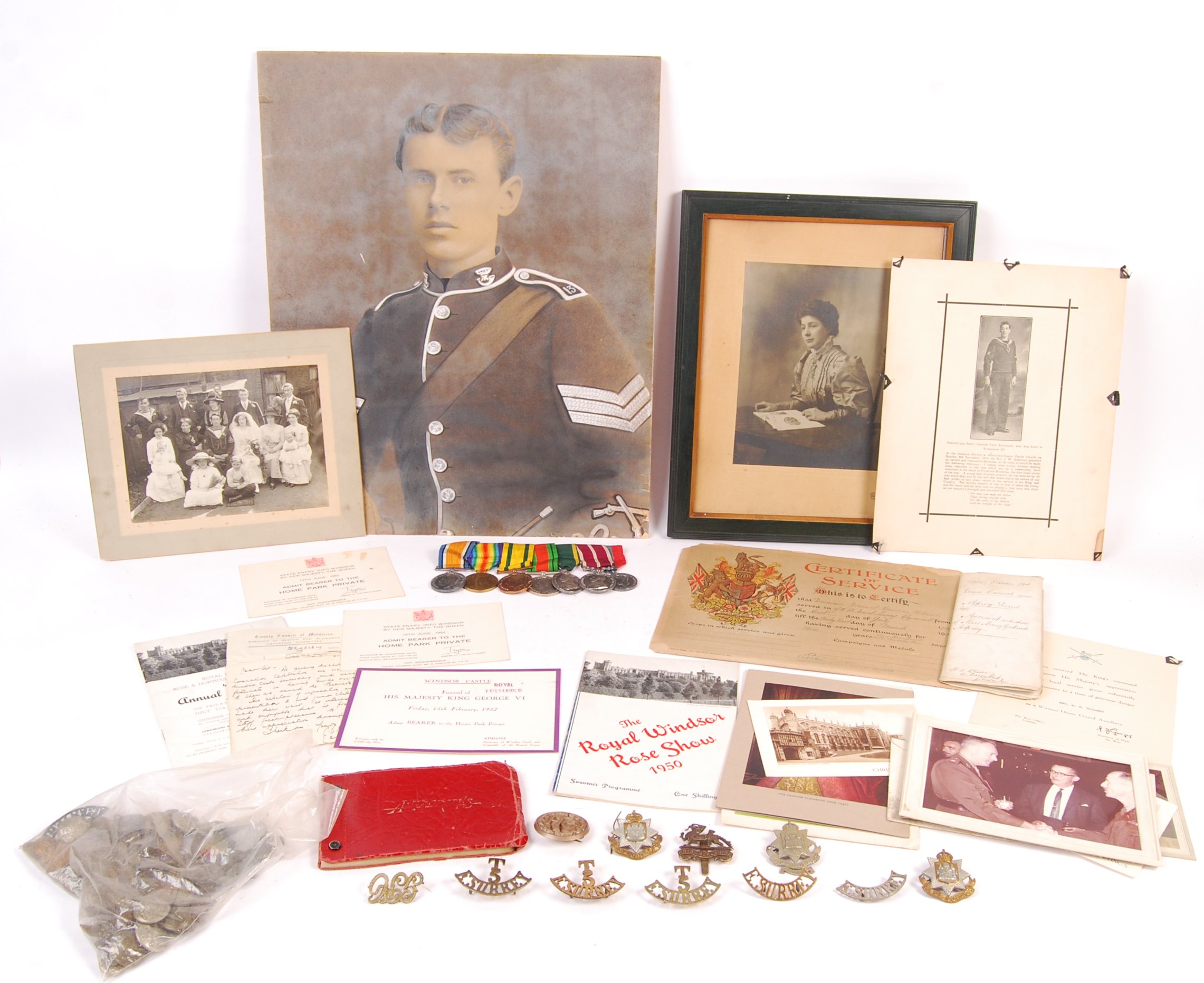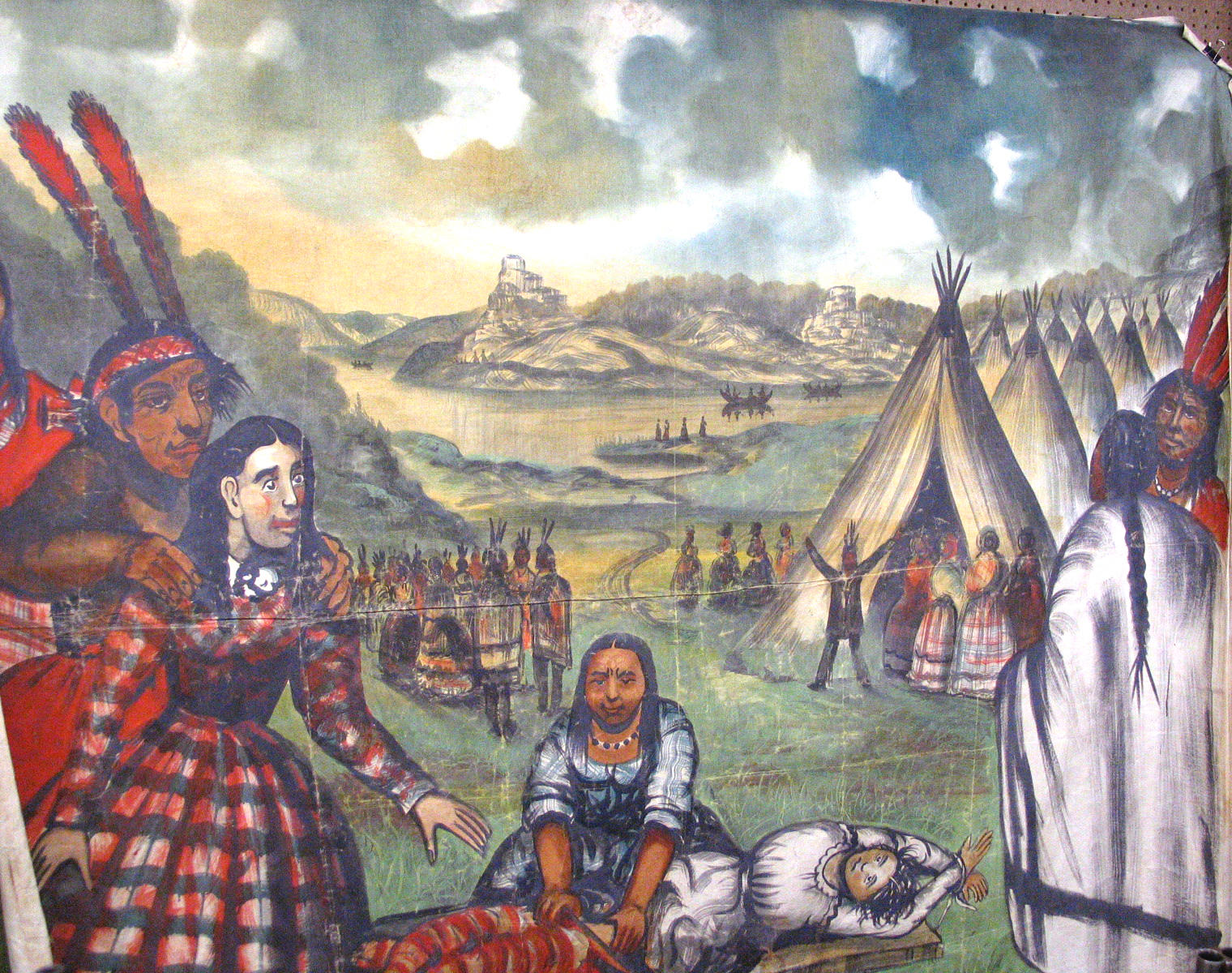Family group: An interesting Great War M.C. group of eight awarded to Lieutenant-Colonel D. S. Lister, The Buffs, who went on to command No. 4 Commando in the Lofoten raid in 1940: ‘A fine swashbuckling type of soldier, a regular Bulldog Drummond’, between the wars he excelled as a heavyweight boxer and represented Great Britain in the Golden Gloves contest in Madison Square Gardens, New York Military Cross, G.V.R., the reverse privately inscribed, ‘2/Lieut. D. S. Lister, 1st Bn. The Buffs, Dickebusch, August 2nd 1918’; British War and Victory Medals (2 Lieut.); 1939-45 Star; Defence and War Medals, M.I.D. oak leaf; Danish Order of the Dannebrog, Knight’s breast badge, Christian X issue, silver, silver-gilt and enamel; Norway, King Haakon VII’s Liberty Cross 1945, silver-gilt and enamel, together with a set of related miniature dress medals, mounted as worn, very fine and better The Boer War and Great War campaign service group of three awarded to Sergeant J. Lister, Royal West Kent Regiment, late Imperial Yeomanry Queen’s South Africa 1899-1902, 4 clasps, Cape Colony, Orange Free State, Transvaal, South Africa 1901 (13693 Serjt., Imp. Yeo.); British War and Victory Medals (GS-7648 Sjt., R.W. Kent R.), mounted as worn, generally good very fine (19) £1200-1500 Footnote M.C. London Gazette 15 October 1918: ‘For conspicuous gallantry when leading his platoon in a raid. He succeeded by his example and daring in enabling his men, though harassed by machine-gun fire, to reach their objective. He shot a sentry and personally secured several prisoners. He did splendid work.’ Mention in despatches London Gazette 27 May 1941. The original joint recommendation for the Lofoten raid states: ‘All four officers carried out their tasks with admirable precision, punctuality and skill, and all kept me in the closest touch with the progress of the operations for which they were responsible. It is very clear from the results obtained that their officers and men worked very well and rapidly under their command. The tasks given to these officers called for considerable tact and quick thinking and the fact that they were carried through within the time allotted and without unpleasant incidents of any sort, shows the officers in question possessed these qualities in addition to military skill and the power of command.’ Norwegian Liberty Cross London Gazette 25 March 1949. Dudley Stuart Lister, who was born in April 1899, was commissioned in the Buffs as a 2nd Lieutenant direct from the R.M.C. Sandhurst in December 1917, and joined the 1st Battalion in the Ypres salient in May 1918, where ‘he soon showed outstanding quality as a leader of men and, in August, was awarded the Military Cross’, as per the above related deeds. Remaining a regular soldier between the wars, Lister was advanced to Lieutenant in June 1919 and to Captain in January 1932, the latter promotion taking place on his return from attachment to the Royal West African Field Force 1929-32. He had, meanwhile, in January 1926, while serving in the 2nd Battalion, The Buffs, been awarded the Knight’s insignia of the Danish Order of Dannebrog, and added to his impressive tally of boxing titles - in 1925 alone he became the Army Officers’, Imperial Service Officers’, Imperial Service All Ranks’ and British Amateur Heavyweight Champion. Not surprisingly, therefore, he was employed at the Army School of Physical Training between 1934 and the renewal of hostilities, gaining further advancement to Major in August 1938. Soon after the outbreak of hostilities Lister was appointed a Company Commander in No. 7 Commando, but in due course was given command of No. 4 Commando in the rank of Lieutenant-Colonel. A glimpse of him at this time may be found in James Dunning’s excellent history, The Fighting Fourth, No. 4 Commando at War 1940-45: ‘Tall, well built and rugged-looking, he was an imposing figure on parade. He was a fitness fanatic, and he based his own fitness - and ours - mainly on the pre-war b
Family group: An interesting Great War M.C. group of eight awarded to Lieutenant-Colonel D. S. Lister, The Buffs, who went on to command No. 4 Commando in the Lofoten raid in 1940: ‘A fine swashbuckling type of soldier, a regular Bulldog Drummond’, between the wars he excelled as a heavyweight boxer and represented Great Britain in the Golden Gloves contest in Madison Square Gardens, New York Military Cross, G.V.R., the reverse privately inscribed, ‘2/Lieut. D. S. Lister, 1st Bn. The Buffs, Dickebusch, August 2nd 1918’; British War and Victory Medals (2 Lieut.); 1939-45 Star; Defence and War Medals, M.I.D. oak leaf; Danish Order of the Dannebrog, Knight’s breast badge, Christian X issue, silver, silver-gilt and enamel; Norway, King Haakon VII’s Liberty Cross 1945, silver-gilt and enamel, together with a set of related miniature dress medals, mounted as worn, very fine and better The Boer War and Great War campaign service group of three awarded to Sergeant J. Lister, Royal West Kent Regiment, late Imperial Yeomanry Queen’s South Africa 1899-1902, 4 clasps, Cape Colony, Orange Free State, Transvaal, South Africa 1901 (13693 Serjt., Imp. Yeo.); British War and Victory Medals (GS-7648 Sjt., R.W. Kent R.), mounted as worn, generally good very fine (19) £1200-1500 Footnote M.C. London Gazette 15 October 1918: ‘For conspicuous gallantry when leading his platoon in a raid. He succeeded by his example and daring in enabling his men, though harassed by machine-gun fire, to reach their objective. He shot a sentry and personally secured several prisoners. He did splendid work.’ Mention in despatches London Gazette 27 May 1941. The original joint recommendation for the Lofoten raid states: ‘All four officers carried out their tasks with admirable precision, punctuality and skill, and all kept me in the closest touch with the progress of the operations for which they were responsible. It is very clear from the results obtained that their officers and men worked very well and rapidly under their command. The tasks given to these officers called for considerable tact and quick thinking and the fact that they were carried through within the time allotted and without unpleasant incidents of any sort, shows the officers in question possessed these qualities in addition to military skill and the power of command.’ Norwegian Liberty Cross London Gazette 25 March 1949. Dudley Stuart Lister, who was born in April 1899, was commissioned in the Buffs as a 2nd Lieutenant direct from the R.M.C. Sandhurst in December 1917, and joined the 1st Battalion in the Ypres salient in May 1918, where ‘he soon showed outstanding quality as a leader of men and, in August, was awarded the Military Cross’, as per the above related deeds. Remaining a regular soldier between the wars, Lister was advanced to Lieutenant in June 1919 and to Captain in January 1932, the latter promotion taking place on his return from attachment to the Royal West African Field Force 1929-32. He had, meanwhile, in January 1926, while serving in the 2nd Battalion, The Buffs, been awarded the Knight’s insignia of the Danish Order of Dannebrog, and added to his impressive tally of boxing titles - in 1925 alone he became the Army Officers’, Imperial Service Officers’, Imperial Service All Ranks’ and British Amateur Heavyweight Champion. Not surprisingly, therefore, he was employed at the Army School of Physical Training between 1934 and the renewal of hostilities, gaining further advancement to Major in August 1938. Soon after the outbreak of hostilities Lister was appointed a Company Commander in No. 7 Commando, but in due course was given command of No. 4 Commando in the rank of Lieutenant-Colonel. A glimpse of him at this time may be found in James Dunning’s excellent history, The Fighting Fourth, No. 4 Commando at War 1940-45: ‘Tall, well built and rugged-looking, he was an imposing figure on parade. He was a fitness fanatic, and he based his own fitness - and ours - mainly on the pre-war b















Testen Sie LotSearch und seine Premium-Features 7 Tage - ohne Kosten!
Lassen Sie sich automatisch über neue Objekte in kommenden Auktionen benachrichtigen.
Suchauftrag anlegen